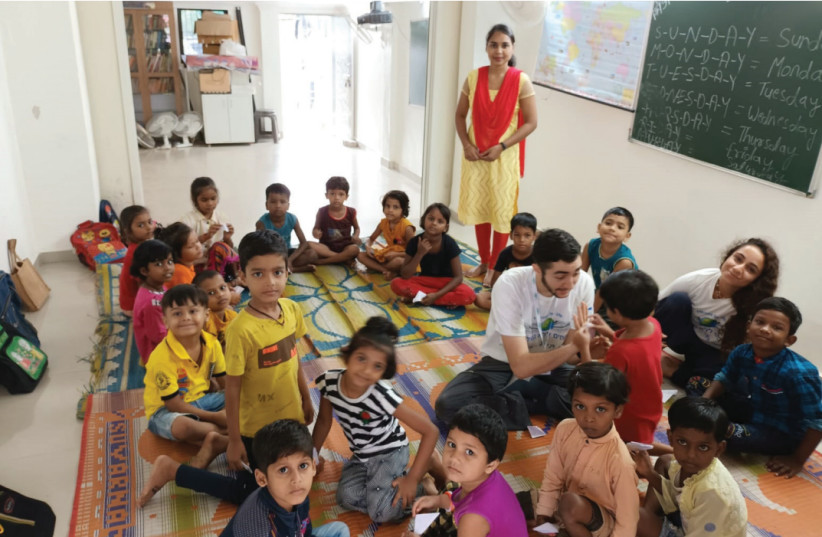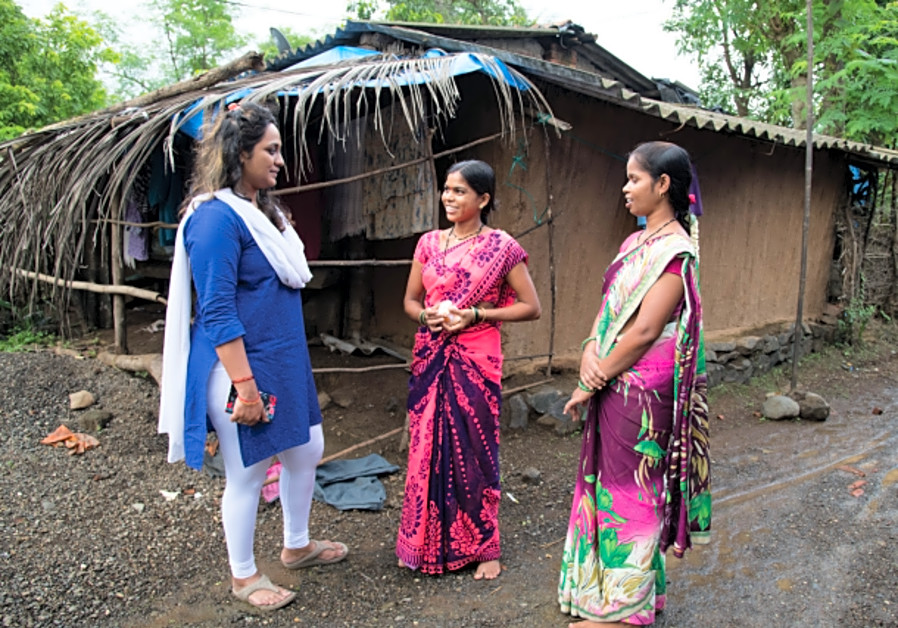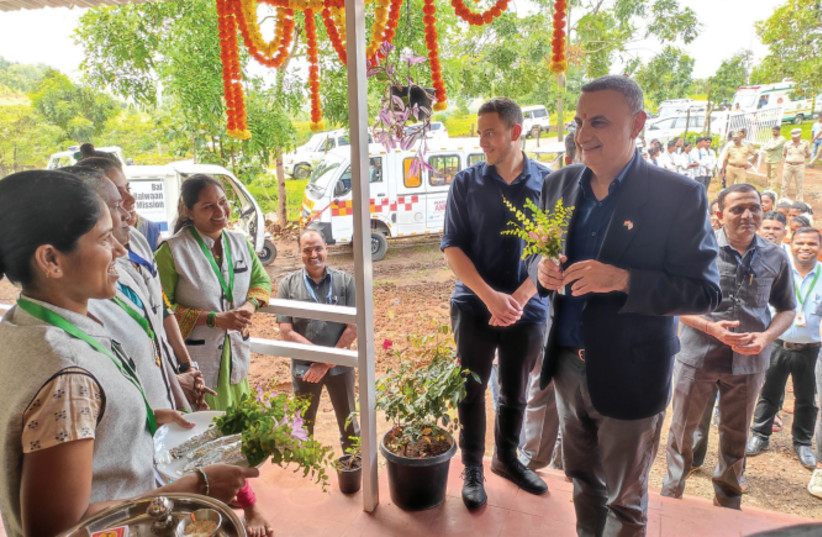Israeli NGOs bring aid to those in need in India
March 3, 2023 – Yeshaya Rosenman, The Jerusalem Post
The Gabriel Project Mumbai (GPM) NGO brings aid to Mumbai, Kalwai and tribal areas. Heroes for Life brings Israeli backpackers as volunteers.

The Indian capital of Delhi is ground zero for Indian politics and media, but high-rising Mumbai is the stylish capital of Indian business and cinema.
Walking out the doors of the airport, one passes shiny new eateries lining the way out, giving way to a highway lined with luxurious hotels and slick skyscrapers – commercial and residential; the kind that fill much of the city and its suburbs. The wealthiest parts of town look as posh as anything New York or London can offer.
But a brief drive south on that highway reveals the extreme disparities that characterize Indian cities. Dharavi, the huge slum that was the inspiration for the novel Q&A and the subsequent film Slumdog Millionaire, is a short distance from Bandra. In this neighborhood, Bollywood stars live in luxury condos next to the Bharat Diamond Bourse, the world’s largest diamond exchange. A taxi driver or bellboy may service wealthy businessmen all day and return at night to his brick two-room home in the Dharavi or Kalwa slums.
Less fortunate neighbors may squat illegally in tin shacks in unrecognized neighborhoods which lack the proper infrastructure for electricity, water and sewage treatment. As contractors may buy the scarce land for development at any time, the squatters also live under constant threat of eviction. Mumbai is Los Angeles with slums, monsoons, and tropical diseases, but interestingly, without gun violence. The slum inhabitants are villagers who moved to the city, work in menial labor and cannot afford the stiff price of housing. They are productive and not tempted to engage in criminal activity.
Into the underbelly of Mumbai
On my visit to Mumbai, I met with people from the Gabriel Project Mumbai (GPM) NGO. GPM is a non-sectarian development organization named after Rabbi Gabriel Holtzberg, a Chabad emissary to Mumbai who was killed with his wife, Rivkah, in the 2008 terror attack.

I visited the Kalwa slums, then rode three hours northeast to see GPM’s work in the tribal villages of the Mokhada subdistrict, where the NGO services roughly 100,000 tribal people in 56 villages. In the two locations combined, there are around 800,000 people living in poverty or “extreme poverty,” defined by the UN as living on less than $2 a day.
Kalwa is a middle-class neighborhood in Mumbai. But if you drive through it, then make the correct turns around the train tracks, you will enter what is almost a netherworld of slums, a topographically lower parallel universe up against the surrounding mountains. People leave for work in the city in the morning, and if they have the money, they bus their children to public schools in the city. Within the slums themselves, living conditions are hard to imagine.
Upon arrival, I was greeted by mounds of garbage on which goats and small pigs roam. It was 11 a.m. and many children were in the streets, neither in school nor working, the latter being the default option. As I waited for my guide, GPM India director Kenneth Dsouza, kindergarten-aged children played in a small stream of sewage next to our car. I was horrified to see young children casually doing something so hazardous for their health.
These scenes propelled Jacob Sztokman to found GPM in 2012. Born in Australia, he had been living in Israel for 30 years and had a comfortable job in IT. In 2011 he went to Mumbai on business for a week, and it changed his life trajectory.
“I saw slums everywhere. Children working, children eating from trash cans, and children with extended stomachs from starvation, all in one week’s time. I couldn’t sleep from the sights. In the following six months, I did online research. I knew nothing about India and nothing about development, but after six months I left my job and opened GPM.”
Jacob Sztokman
“I saw slums everywhere,” he recalls. “Children working, children eating from trash cans, and children with extended stomachs from starvation, all in one week’s time. I couldn’t sleep from the sights. In the following six months, I did online research. I knew nothing about India and nothing about development, but after six months I left my job and opened GPM.
“At first, we partnered with Father Trevor Miranda, a Jesuit priest I had been introduced to in Mumbai, who I count as one of my first mentors. He ran classes in shacks throughout Kalwa, and we supplied nutritious meals. But I decided I wanted to build a comprehensive strategy and create a holistic solution to extreme poverty in Kalwa. Since then, I have completed an MSc in international development from Hebrew University and a BA in non-profit management from Gratz College.”
Dsouza took me around GPM’s projects in the neighborhood. A small medical clinic, staffed by a physician and two nurses, provides first aid and basic emergency medicine; medical care and guidance for pregnant women; vaccinations for children and for COVID. It also has enough expertise to send seriously ill patients by ambulance to the public hospitals of Mumbai.
Across the street, GPM has a shop with large water purification vats to supply as much clean water as possible. Nutritious meals are provided for children, pregnant women, and other vulnerable people. GPM insists on employing locals for all the activities and not depending on foreigners. Accordingly, the programs are owned and managed by the community, essential components of sustainable development programs.
I was taken around the corner to the school GPM operates for children whose families cannot afford to send them to schools in town. The two-story building houses four large classrooms and a computer center. In these classrooms, elementary-aged schoolchildren learn reading, arithmetic, computer literacy and English, in classes of around 30.
I found the children sitting on mats, joyfully learning English through games with local teachers and with young Israeli volunteers from Heroes for Life, an NGO that organizes humanitarian volunteering for Israeli backpackers on their post-military treks. In Kalwa, they volunteer as teachers and maintenance workers.
The young men and women seemed to be having a great time. I was told that whenever the Heroes’ volunteers come to teach, word soon gets out and school attendance rises daily throughout their two-week volunteering stints.
After briefly hearing from them about how meaningful the experience is, I told them I would hear more about at the dinner for Heroes the following night at the house of consul-general of Israel to Mumbai, Kobbi Shoshani. I then departed with Dsouza on the long drive up to rural Mokhada.
Rough beauty and sharp vision
Mokhada subdistrict is located at the beginning of the western Ghat Mountains that line India’s southwestern coast. The scenery is pristine. Rolling green mountains are dotted with streams, waterfalls, forests, and shepherds herding cows, goats or buffalo.
We rode past a large dam on a narrow, recently repaved highway. The Indian government has done development work there, and houses have electricity.
But India has so many poor, that it will take decades more to alleviate poverty.
The villagers are Adivasi – tribal Indians, questionably Hindu to many Indians. They may view themselves as Hindus or Muslims, but many also worship local deities. They enjoy preferential status under the category of “scheduled castes,” but most are dirt poor.
Touring the villages immediately taught me that not all villages are created equal. Villagers with good jobs such as public school teachers can afford two-story brick houses, while others can barely afford minimal amenities. In the poorest villages I visited, three generations live in mud houses with chickens and cows. The entire day, I passed by herds of cows being tended to by young children to elderly women.
The first project I visited was three offices with Internet services, operated in partnership with IsraAID. There, villagers – most of them illiterate farmers – are assisted by courteous local GPM workers who help with sending their bureaucratic paperwork to the authorities in the capitals. The government has many grants and social benefits, such as agriculture support and pensions, but they are useless if people are unable to apply for them.
Dsouza is from Mumbai. He is a distant descendant of the Portuguese colonists of Goa. He worked as a recording musician and composer for years but was looking for something more meaningful. After touring with him for most of the day, his enthusiasm made it clear that he has found his calling. He is active in administrating the few dozen locations of GPM’s humanitarian projects in Mokhada, but he also plays the role of visionary.
At one point we stopped between villages next to a beautiful hilltop with a forest, creek, and waterfall – lush greenery as far as the eye could see.
“On this hilltop, we will build a development village,” he told me. “Similar to the Yemin Orde and Ben Shemen youth villages that Jacob showed me in Israel. The village will bring good nutrition, healthcare, quality education and dignified livelihoods to the entire Mokhada. Youth will come here to acquire tools for their development: agriculture, sanitation, nutrition, and health studies. We will build an education center and teach STEM [science, technology, engineering, and mathematics] classes.”
He elaborated a vision that is both genius and science fiction: Israeli STEM students who want a trip to India will lodge at the village and teach STEM for a few weeks, enjoying the exotic beauty and the anthropological adventure. I have to admit that many a painter would pay good money for the scenery, even if Dsouza was just building an inn.
Many GPM activities involve social work with a flair of creative genius. One example is hygiene.
One of GPM’s women’s economic empowerment collectives is Sundar India, the brainchild of a Jewish American woman, Erin Zaikis. Sundar India collects bars of high-quality, barely used soap from 60 five-star hotels. The soap is sent with Uber drivers to a small workshop, which Dsouza took me to see. There, three young women peel off the used surfaces with vegetable peelers, grind up the bars, heat them, press them into blocks, cut them, and repackage them.
Then sacks full of soap are given to other workers, who ride from village to village, where they don costumes and present a play to young children. In the play, a young boy is threatened by evil germs spreading disease and is saved by washing with soap. The soaps are then handed out to the children to take home. So far, over the past six years, 17 tons of soap have been saved from landfill, recycled and distributed.

Healthcare and health education
Sztokman recalls the beginnings of GPM’s healthcare efforts: “In 2016, over 500 children died of starvation in Mokhada. The government then came with emergency aid, but it quickly dissipated. We opened Bal Balwaan (Strong Healthy Babies) Mission. It’s a special ward in the local hospital staffed by doctors, nurses, and dieticians for children diagnosed with SAM – severe acute malnutrition.
“These children are stunted, and their internal organs cannot develop properly. With the professional medical care and nutrition our staff provides, they are completely new children within three to four months. Any children with illnesses that do not allow them to eat properly we send away for hospital care in the city until they heal. We make sure all parents bring their babies in for monthly checkups.”
During corona, GPM and IsraAID purchased industrial oxygen production machinery, ensuring a steady supply for the 30-bed government rural hospital.
I took a short ride with Dsouza to a shiny new kitchen and lunchroom that GPM built between two villages. I was warmly welcomed by the cooking staff, and we ate a tasty and filling pure-veg lunch. The grain being used is Nagli (finger-millet), a nutritious indigenous grain that GPM introduced to local farmers. Strawberries were introduced as well as a cash crop.
This kitchen services the nutrition project. The food cooked there is tightly monitored for nutritional content by the dietitians at Bal Balwaan. Each child receiving care gets exactly his needs in every packaged meal.
A small gift shop next to the kitchen allows outside visitors to purchase sweets and handicrafts and spread the word about GPM’s work. During my day of touring in Mokhada, Dsouza took me to numerous handicraft workshops run by GPM women’s livelihood collectives, with products ranging from groundnut oil to stylish paper and cloth bags, to herbal ointments and traditional toys. A serious manager, Dsouza stressed that he is always trying to raise production standards to eventually make the products marketable in high-end markets.
Sztokman and Dsouza both emphasize that supplying information can be as crucial as supplying material aid.
Noted Sztokman: “We also work on educating the parents on nutrition and childcare. Some of the malnutrition is caused by infections or diseases such as scabies. Part of it was lack of food. But sometimes there is food to be found. Spinach grows wild all over Mokhada, but villagers thought it was only fit for livestock. We demonstrated that it is very nutritious for humans, too.
“Sometimes, local traditions need to be addressed. One such tradition was to limit the food intake of mothers of newborns to water from cooked rice. We were able to explain to villagers that this tradition was harmful because it was explained to them by local doctors, and it was not a religious tradition, anyway.”
Dsouza added that many villagers fall into fatalism and think they cannot escape their poverty. GPM’s proactive approach to combating poverty is often a refreshing change of attitude at a fundamental level.
Heroes in Mumbai
At the apartment of the Israel consulate general in Mumbai, a festive dinner was served in honor of Heroes for Life. I spoke with Roi Almog and Adi Goldberg, the heads of this delegation of 20 volunteers. Heroes brings Israeli backpackers for two weeks of volunteer work in Mumbai slums before their big trek begins. They spend half of each day teaching children aged six to 10, and half doing maintenance work.
Heroes was founded by three former Duvedevan commandos in 2014. It now operates in 18 locations worldwide and counts over 1,500 alumni. Mumbai was their first volunteering location, to which they have now returned after a COVID-forced hiatus. During COVID, Heroes operated in Israel, assisting Holocaust survivors with repair work and youth-at-risk with schoolwork.
I was impressed not only with the idealism of Heroes volunteers but also by their proud Israeli identity and diverse sociological profile. They insisted on meeting Mumbai’s small Jewish community and see themselves as proud ambassadors of Israel. These are not rich kids with cushy foreign-aid jobs.
Almog told me that when the volunteers first meet the children, they are usually moved to tears. For the first time, they meet children for whom elementary school or a steady supply of food and clean water is not to be taken for granted. The interaction with the kids is very warm, and the volunteers feel grateful for the chance to perform meaningful acts of charity for no personal benefit. It is an experience they will cherish.
I asked Almog about the vision. “Every year, 40,000 Israeli backpackers venture abroad,” he informed me. “Eight thousand of them apply for slots with us. We hope we can reach them all and operate in 50 countries worldwide, bringing Israeli good spirits and good deeds wherever we go.”






